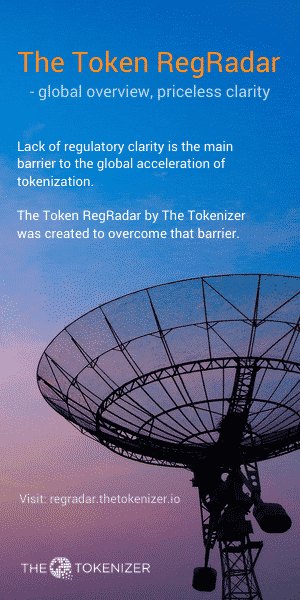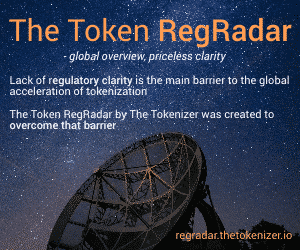PM of Liechtenstein: Innovative companies express a strong wish for legal certainty
– an interview with the Prime Minister of Liechtenstein, Adrian Hasler
By Michael Juul Rugaard and Tom Penn
Currently, the parliament of the Principality of Liechtenstein is about to process and adopt a new and innovative token law that answers questions such as: “What are the rights of persons holding a token?” and “How does the token right correspond to the ‘real world’ right, for example if you tokenize a real-world asset?”
On the occasion of this new law The Tokenizer publishes in-debt interviews with two key persons behind the token law, Director for the Office for Financial Market Innovation (SFI), Dr Thomas Dünser, and Prime Minister, Principality of Liechtenstein, Adrian Hasler.
In this interview with the Prime Minister, the principal focus will be on Liechtenstein’s and Adrian Hasler’s vision and strategy for the future of the token economy. And the overall question is how and why Liechtenstein is taking a European lead on a regulated way forward within the areas of blockchain and crypto?
The Tokenizer (TT): We got the understanding from talking with Dr Thomas Dünser that you have been following the development within blockchain and crypto for several years. How did you get interested? And when did you realize the potential that blockchain and a token economy – assumably – possess?
Adrian Hasler (AH): In early 2014, I realized that the impact of digitalization on the financial industry is strongly increasing. It was clear to me that the capacity to innovate and to adopt new technologies at an early stage will belong to the core competencies of financial service providers. Given that in this sector, the level of regulation is very high and detailed, private innovation is often restricted by rules that have not been defined for the new digital possibilities. Therefore I established a governmental framework in order to support innovative companies. Because of this deep and direct dialogue with technology leaders, my Ministry and the Financial Market Authority realized very early on that the impact of blockchain on the financial industry is much more than only the case of bitcoin. At that time, I decided to establish an expert group under the direction of Thomas Dünser in order to find a proper way for Liechtenstein to approach the chances and risks of blockchain. This expert group has seen the potential of blockchain and has been developing the concept for the regulation of the token economy.
TT: From your position as Prime Minister, what is your vision on behalf of Liechtenstein for how your country may utilize the potential of blockchain and the token economy?
AH: Digitalization is one of the important drivers for changing our economy and society. The invention of blockchain has set free a new kind of economy that may have a big effect on existing business models. As Prime Minister, I have to ensure that the wealth and prosperity of my country will be maintained in the future. Therefore, it is important for the business sector in Liechtenstein to deeply understand this development and adapt its business models and for new companies to start up with promising ideas. In parallel, the State and its authorities have to catch up with this development as well: first, when innovative companies apply for business licences, and second when the authorities should ensure compliance with the laws and prosecute abuse.
My vision of Liechtenstein is to ensure the capacity to innovate and to establish practical know-how about this and other technologies in order to seize opportunities and manage risks.
TT: In the summary of the new token law (TVTG) it says: “Aufgrund des hohen Potentials der «Token-Ökonomie» für breite Teile der Wirtschaft will die Regierung mit diesem Gesetz die Rechtssicherheit für Nutzer und Dienstleister stärken, um die positive Entwicklung der Token-Ökonomie in Liechtenstein zu unterstützen.” How big a potential do you think the token economy has in let’s say the next 5-10 years? Why is it important now to secure “Rechtssicherheit für Nutzer und Dienstleister”? *
AH: I expect that the token economy has great potential and will cover an increasing part of the whole economy. As we see at the moment, the use of tokens for the financing of non-listed companies is strongly increasing, as well as the tokenization of physical assets. Further applications – such as tokenizing intellectual property or art – will follow sooner or later.
For me, it is not important how big the token economy will be in 10 years. The invention of blockchain made something possible that was not feasible before: transferring digital information without the risks of being copied and manipulated. And this is important to many applications, e.g. the digital representation of assets, money etc. These new possibilities raise many fundamental questions that have not been clearly answered in our legal systems up to now. As a state, we are obliged to ensure legal certainty for people and companies. Interestingly, innovative companies are expressing a strong wish for legal certainty.
TT: Why is regulation of this area probably not only necessary but in fact, a good thing that might encourage innovation instead of being an obstruction for innovation? (if you agree with that view?)
AH: The entrepreneurs that come to Liechtenstein usually want a clear legal framework for their business. They want to focus on their business without being exposed to uncertainty concerning future problems with competent authorities.
The token economy has a direct link with the legal system. This is why a good legal framework for the token economy will encourage innovation.
TT: Historically Liechtenstein has been known for its very strict bank secrecy, but around 2012 – I believe it was – Alois von und zu Liechtenstein declared that in the future the country wanted to support, encourage and embrace financial regulation in a much higher degree than before. Have you had any concerns about Liechtenstein’s reputation and credibility by taking the lead as a country friendly to the token economy?
AH: The token economy is not equal to ICOs and bitcoin. With our law, we will set clear guidelines for service providers that will ensure a development towards professionalization. Consequently, our law helps to reduce the risks – including possible reputation risks for Liechtenstein.
Personally, I am convinced that it is a much better approach for a state to offer good conditions for the good applications of new technology and integrate the technology into the legal framework rather than trying to prohibit it completely. A prohibition approach will push all people – both good businesspeople and criminals – into legal grey or black areas and will increase the difficulties of fighting crime.
TT: Is the new token law a way for Liechtenstein to make clear that you are not only supporting regulation, but in fact, you are leading the way in a European context?
AH: First of all, we want to solve the issues that we see in Liechtenstein. It would be great if European countries were inspired by our vision and our law. I am convinced that Europe now has a great opportunity to be the leading economic region for the token economy – because the EU has the vision of the digital single market and the instruments to create Europe-wide legal certainty for all kinds of applications. Liechtenstein wants to contribute actively to this development in Europe.
TT: ESMA announced a blockchain law some months ago for the EU and EEA. What are, in your opinion, the main similarities and differences between the two laws?
AH: ESMA is taking care of the regulation of the financial market applications of blockchain. There are many questions open at the moment, and it is important that ESMA clarifies these issues.
Our law is complementary to financial market regulation. Liechtenstein is a member of the EEA and implements the EU directives governing the financial market. If securities and financial instruments are tokenized, the relevant European laws are implicitly applicable. Our Token and TT Service Provider Act creates a set of rules for all other cases. The two laws, therefore, are not comparable.
TT: What are your strategic goals in terms of further supporting the development of the token economy?
AH: When the law enters into force, we will have achieved a major goal. But of course, we will stay in close contact with innovative companies in order to find other aspects of the legal framework to improve. From my perspective, we are at the very beginning of a longer development.
The original German version of the token law: https://www.llv.li/files/srk/bua_054_2019_tvtg.pdf
The English translation of the token law: https://impuls-liechtenstein.li/wp-content/uploads/2019/06/Draft-Token-and-TT-Service-Provider-Act.pdf
More about initiatives within blockchain in Liechtenstein: https://impuls-liechtenstein.li/blockchain-gesetz/
* The English translation of the German law text quoted in the question above: “Because of the enormous potential of the ‘token economy’ for large parts of the economy, the government wants with this Law to increase legal certainty for users and service providers to support the positive development of the token economy in Liechtenstein.“
More Articles:
Liechtenstein takes the lead with new token law
Switzerland and Liechtenstein improve their crypto friendly regulations to favour STOs
You Might also Like















